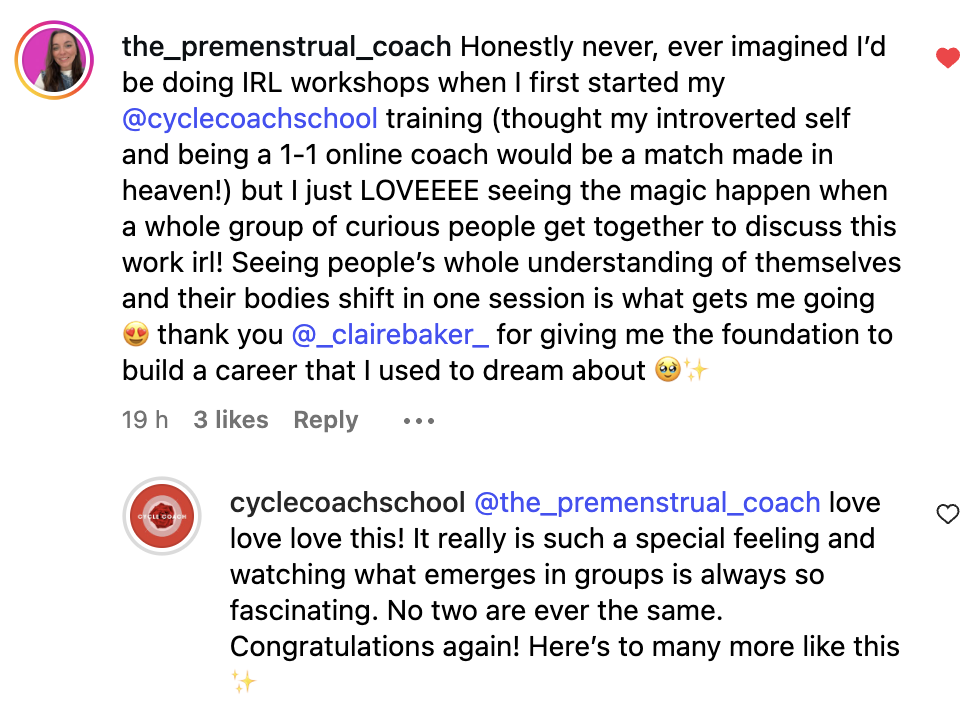How to Confidently Hold Group Spaces: A Guide for Menstrual Cycle Awareness Coaches & Facilitators
If you’ve ever felt the pull to run circles, workshops or courses around menstrual cycle awareness… and then thought, “Who am I to do that? What if I can’t hold it all?”, then you’re in the right place.
Group work is one of the most powerful ways to share cyclical awareness. It’s also one of the scariest for many coaches and practitioners. That’s exactly why I teach it inside the Cycle Coach School training: because the world doesn’t just need more menstrual educators sharing information (though that’s a great start!), it needs skilled facilitators who know how to safely hold a room (or a Zoom) full of tender, bleeding humans and their myriad of experiences.
This post will walk you through why group work is so potent, the common challenges involved and what to actually consider when you start designing your own spaces.
Why is group work so powerful?
Over the last 13 years, I’ve taught my signature Adore Your Cycle workshops (short two-hour sessions to full-day immersions), a three-day retreat called Cycle Love, short corporate talks, eight cohorts of Cycle Coach School, online courses with group calls and forums, and held an ongoing community space.
And what I’ve noticed is that every single time a new group gathers, there is a unique collective energy that forms. That particular mix of cycles, ages, stories and nervous systems will never exist in exactly that way again. When a circle is held with care, something powerful and mysterious arises in the middle of it.
Group work can help heal a very specific feminine wound: the wounding around being with other women. The comparison. The mistrust. The “I’m the only one who feels like this.” When people sit in a Menstruality-honouring circle and hear their own story echoed in someone else’s words, shame starts to melt.
There are also very practical reasons to get skilled at group work:
You reach more people in the same amount of time
These offers can support your business sustainability
Participants learn from each other, not just from you
The hierarchy softens — the group becomes a teacher too
Inside Cycle Coach, trainees are often surprised by how energised they feel after facilitating groups, once they’ve learned how to structure, pace and protect their energy.
That’s the piece most people never get taught.
Check out this recent comment from our alumni Laurie Jones a.k.a The Pre-Menstrual Coach:
What are the real challenges? Can you just “wing it?”
Here’s the honest bit: holding group spaces is no joke.
You’re juggling:
your own energy and nervous system
time boundaries
group dynamics and conflict
varying levels of vulnerability and experience
the actual content you’re there to teach
If you’ve ever held a workshop, and left feeling like you talked too much, ran out of time, didn’t quite manage the over-sharer (there’s always one), or lost the thread of what you were trying to teach… that’s not a failing.
That’s just missing skills and structure.
This is why I’m pretty firm on this: group work requires planning and preparation, not just good intentions.
Key questions to ask yourself when you’re designing a group space:
What’s the clear intention of this group?
What do I want people to walk away with?
How much time do we have and how will I use it?
Who is this for?
How many people can I genuinely hold?
What exercises, rituals or practices actually serve this group (and which are just “because I saw someone else do it on Instagram”)?
In the training, we take these questions and turn them into actual structure: sample run sheets, example openings/closings and a simple framework you can adapt to any group you run.
Just how structured should a group space be? What about leaving space for sharing & flow?
I think of group facilitation as a dance between structure and flow.
You absolutely need structure:
a plan for the session
timing for shares, breaks and practices
clear boundaries and agreements
But you also need to be able to feel when something important is happening in the room. I like to work with an emergent energy, which means I’m tuned in to what is actually emerging in the group: a wobble, a wave of emotion, a topic that clearly needs more time, and so then I let the plan soften.
That’s the part you can’t learn from a template alone. It comes from practice, feedback and having language and tools for what you’re sensing.
In Cycle Coach, we unpack this together: when to gently redirect, when to stay with a moment, how to close a process safely and how to bring a group back when the energy scatters.
How can I create warm, inclusive & safe group spaces?
Menstrual cycle awareness is intimate work. You’re asking people to talk about or reflect on their bodies, blood, shame, pain, sex, trauma, identity, and possibly with people they don’t know very well. That requires a very intentional container.
Some anchors that matter:
Asking for accessibility needs, age, gender and dietary requirements in advance
Naming confidentiality clearly and getting explicit agreement from everyone
Stating what behaviour is and isn’t welcome in the space
Making a genuine effort to remember and use people’s names
Checking in with quieter participants without forcing them to perform
And then there’s the big one: you go first.
If you want a group where people take off the mask and show up as they are, you have to model that, but without turning the space into a therapy session for you. It’s a subtle line and it’s one we talk about a lot in the training, because I see so many sensitive, caring facilitators over-share or under-share out of nerves.
What are the key differences in online or offline group work?
Whether you’re in a yoga studio, a living room or on Zoom call, your presence and intention are what create the field.
In person, you might play with:
natural light, cushions, blankets and comfy seating
a simple altar in the centre, divided into the four phases of the cycle
treats, tea, chocolate and tiny pockets of pleasure
Online, you can still:
light a candle and ground yourself before the call
guide everyone into a meditation to “arrive” together
share music or relevant videos
use breakout rooms for listening partnerships and small-group sharing
And remember, group work doesn’t have to mean launching one huge, perfect signature program. You can build an ecosystem: small intro workshops, circles on specific themes (menarche, creativity, perimenopause), short courses and deeper journeys.
It’s also been my experience that group workshops are a great way for potential clients to get to know you, before deciding to work more deeply together in a 1:1 setting.
Inside Cycle Coach, I show you the flow of my own offerings — from free class to ebook to courses and circles — and we provide prompts to inspire you to design your own pathway instead of trying to copy-paste someone else’s.
If group work is calling you…
That’s fantastic! We love to hear it. If group work is tugging on your sleeve, but you’re scared you’ll mess it up and won’t know how to hold big feelings that emerge or will end up totally drained… that doesn’t mean you’re not cut out for it.
It just means you’re ready to learn the craft.
That’s exactly what we do inside Cycle Coach School.
We take your love for Menstruality, your existing skills and your very real sensitivity, and we turn them into grounded, ethical, powerful group facilitation.
So that when you open the Zoom room or light the first candle in a circle, you’re not just hoping for the best.
You’re holding a space you know how to tend.
If that’s what you’re craving, this training was built for you.
Our Cycle Coach Self-Study program gives you the skills, language and embodied confidence to bring this work into your professional practice with integrity and impact.
Doors are open! Step into this powerful work today.





